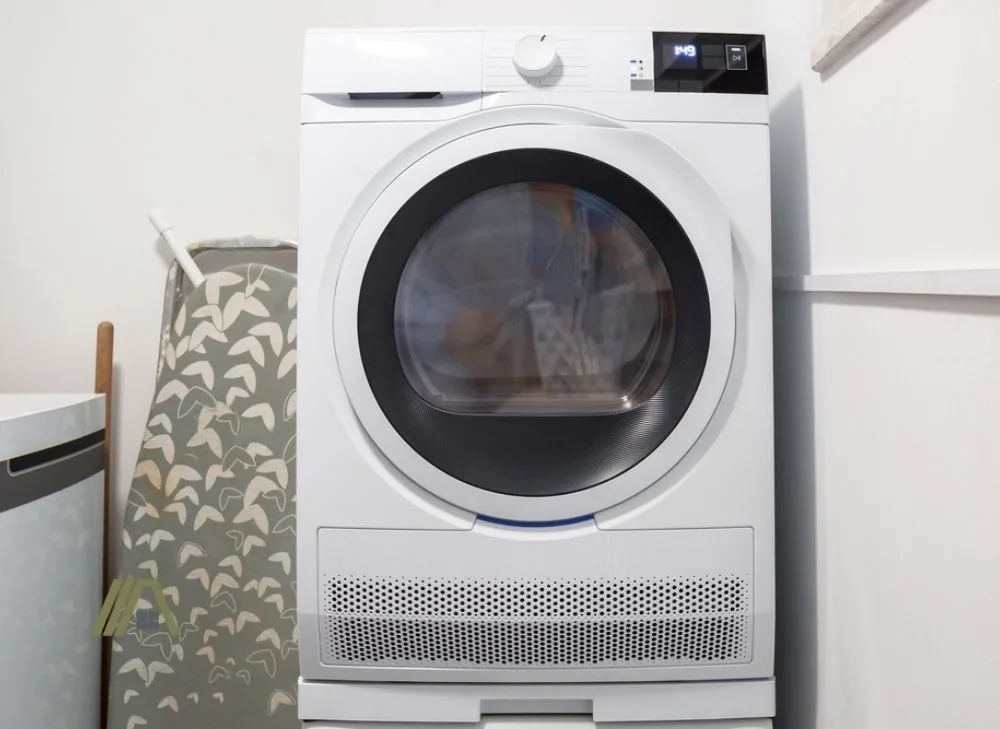| Pros | Cons |
| Dries clothes faster than electric dryers. | Not as available as electric units and expensive initial purchase, installation, and maintenance cost. |
| Uses less energy than electric units. | It needs to be vented outside, which makes it inconvenient for people who can’t or don’t want to make a hole in their walls, ceilings, and roofs. |
| Low operation cost. | Difficult and expensive to install. |
| Vents to the outdoors, eliminating the need to manually empty a moisture containment tray. | Poses a fire hazard and a risk of poisonous carbon monoxide leaks. |
| Doesn’t require a special electrical outlet. It can connect to regular 110-120 volt household outlets. | Requires a gas line to function. |
| Easy to convert between natural gas and liquid propane. | Electricity is still required for the dryer to be operational and functional. |

Gas dryers are fast, energy-efficient, and cheap to run. They can be connected to regular electrical outlets but need a gas line to function. They have to vent directly outside. They pose a fire hazard and the risk of gas leaks. They are less available and more expensive to purchase and service.
Pros of Gas Dryers
Gas Dryers Are Fast
Gas dryers are heated through a process of combustion. This causes the burners to heat up almost immediately, unlike electric units that become hot more gradually.
The increased heat level in a gas dryer makes for shorter drying cycles. Depending on the model, gas dryers can shorten drying time up to half the time required by an electric unit!
Gas dryers are ideal for large households that go through multiple loads of laundry weekly. It’s also great for individuals with busy schedules.
A faster cycle implies that fabrics are exposed to heat for a shorter period. As a result, gas dryers are gentler on clothes than electric dryers that tumble fabrics in a heated drum for longer.
We compare the drying time of 20+ models of gas and electric dryers if you would like to see this demonstrated.
Energy Efficiency
Although gas dryers are heated by gas, they require electricity to power the motor, controls, fan, and drum. However, the gas component ensures that the dryer doesn’t use too much electricity, unlike an electric dryer that relies solely on electricity for its operations and function.
I stated earlier that a gas dryer dries fabric faster than an electric unit. By combining its speed with the energy savings from the low use of electricity, the dryer provides great energy efficiency.
Electric clothes dryers are one of the most significant energy-consuming appliances in a home. Some gas units can reduce energy consumption by half.

Note: this only applies to electric vented units. Ventless electric dryers are also considered to be energy-efficient.
Low Operating Cost
The energy efficiency and shorter operation time of gas dryers mean that you spend less on running costs.
On top of that, natural gas and propane cost less than electricity in most regions. While an electric dryer consumes about 800 kWh a year, gas dryers use only 30 therms of gas yearly.
Depending on the cost of gas in the area and the dryer model, the cost of running a gas dryer is priced between $0.15 to $0.30 per load. On the other hand, the cost of running an electric dryer typically ranges between $0.30 to $0.40 per load.
Some gas dryers require half the cost used by an electric unit for identical laundry loads.
Vents to the Outside
All gas dryers vent outside. This way, carbon monoxide and humid, hot air don’t remain inside the house but are safely released to the outdoors.
There is no need to plumb in a drainage system or manually empty out a condenser tray, which is required for condenser dryer models. These dryers also have the potential to create condensation in the room since they do not vent the air out of the house.
Gas dryers provide a convenient, energy-efficient option for anyone who prefers vented dryers.
Don’t Require a Special Electrical Outlet
Electric dryers require a relatively high amount of electricity to function, primarily because electricity is used to heat up the unit as well as run the motor and controls. As a result, regular 110 volts outlets aren’t sufficient for electric dryers and most electric dryers require a 240-volt outlet to function.
The cost of the outlet is not always included in the cost of the unit, and this might come as a surprise to first-time users of electric dryers.
Gas dryers, on the other hand, can be plugged into regular 110-120 volt household outlets. In addition to this, gas dryers are less of a risk when used with extension leads because they pull less power than fully electric models.

Easy to Convert Between Propane and Natural Gas
If you have a natural gas dryer but are moving to a new home that only has a liquid propane tank, you can keep your dryer and simply use a relatively inexpensive conversion kit to make the appliance compatible with the new gas form.
Cons of Gas Dryers
Expensive and Less Available
The initial cost of purchasing a gas dryer is considerably more than that of an electric model.
The price of electric dryers ranges from $400 to $650, while gas units are priced between $500 and $800. Most brands that offer both electric and gas options tend to add about $100 to the cost of the electric unit.
Electric dryers are the appliance of choice for most homes in America. Thus, it’s easier to find a large variety of electric dryer sizes and models as opposed to the limited selection of gas dryers.
Need an Outside Vent
As a safety precaution, all gas dryers are designed to vent outside. As a result, you aren’t given the option to purchase a ventless unit as you could if you were buying an electric dryer.
The main objection homeowners have against vented dryers is the need to create a hole in the wall.
For instance, if you are still working through the arrangement of things in your home, you wouldn’t want to do something as permanent as fitting a dryer vent into your wall. When the dryer needs to be in a room in the middle of the house venting it is also difficult.
Gas dryers are best suited for individuals with a laundry room. Therefore, if you do not have a dedicated laundry room, the vent of a gas dryer can mess with the aesthetics of your home.
Depending on the apartment policy, tenants might be unable to install dryer vents. This automatically eliminates gas units as a dryer option for them.
Another downside to having a vented dryer is the maintenance of the ductwork. Any leaks or breakages have to be attended to and the vents need to be cleaned out regularly to prevent the buildup of lint, which reduces the dryer’s efficiency and creates a fire risk.
Difficult to Install
State rules demand that gas dryers shall be installed and repaired only by licensed professionals. This is because connecting the dryer to gas is a tricky procedure since gas dryers pose a risk of gas leaks.
Thus, even if you are a skillful DIY-er, you’d still have to pay for the services of a licensed professional for installation and repairs to ensure that gas connections are tightly fitted so that there are no leaks.
Electric units are free of the hassle of fitting gas connections and can be installed by a savvy DIY-er.
Older homes might not possess a gas line. Thus, if you’re installing a gas dryer for the first time and cannot locate a propane or natural gas connection, you will have to contact your local gas utility company.
Apart from the hassle of gas connections, you also have to install a vent and an electric outlet (if unavailable in your chosen location).
Potential Leaks and Fire Hazard
Both electric and gas dryers pose certain safety risks. According to the National Fire Protection Association, an average of 15,970 household fires between 2010-2014 are attributed to dryers and washing machines. However, it is the dryers that are responsible for 92% of these fires.

Lint is very flammable, so homeowners are advised to empty the lint filter after every load and clean the vent at least twice a year to get rid of lint and other impurities.
Gas dryers are a more considerable safety hazard than electric units as, on top of the fires, they can also lead to carbon monoxide poisoning caused by gas leaks.

The primary cause of gas leaks are poorly fitted pipes. Hence the importance of contacting professionals for the installation and repair of gas dryers.
To ensure that leaks are not gone undetected, it is advised that you place a carbon monoxide detector (amazon link) close to the dryer.
Two major indicators of carbon monoxide leaks include brownish-yellow stains around the appliance and stuffy-smelling air.
Gas Line Required
Gas dryers are heated by either natural or propane gas. Therefore, you would need a gas hookup to run the dryer.
If your house is routed to a gas line, you could simply employ a licensed technician to link your unit to the gas connection.
Should you be unable to identify a gas line or live in an older home that only has an electric connection, you would have to contact your local gas utility provider. This would add extra costs, depending on what needs to be done. It can be as low as $150 or as high as $800.
Contacting the local utility company could be an expensive and time-consuming undertaking, especially for houses that aren’t connected to a gas line.
Alternatively, you would have to buy and refill a propane tank.
You Still Need Electricity to Power the Appliance
Gas dryers run on both electricity and gas. Gas provides the fuel for the heating element while electricity operates the control panel, air blower, and tumbler.
This means that having a gas dryer does not mean that it will be able to function when there is a power outage. On the other hand, most programs of gas dryers cannot function without gas even if there is electricity.
Sources
https://www.nrdc.org/sites/default/files/ene_14060901a.pdf
